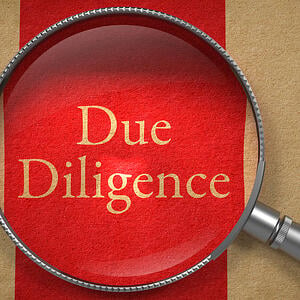
Whether investing in a startup, buying a business, or merging with another business, interested parties typically perform an investigative process known as due diligence. After all, they absolutely need to know what they are getting into before making a decision to invest, buy, or merge. The due diligence process is an obligation that all serious contenders should take seriously.
What is Due Diligence?
The dictionary defines due diligence as:
- Reasonable steps taken by a person in order to satisfy a legal requirement, especially in buying or selling something
- A comprehensive appraisal of a business undertaken by a prospective buyer, especially to establish its assets and liabilities and evaluate its commercial potential
When investing in or acquiring a company, potential buyers need to gather a large amount of data to make an informed decision on the process. For example, they would need to know about the company's:
- Business plan and model
- Reputation
- Market Valuation
- Profits and losses
- Debt position
- Status of accounts receivable
- Past performance
- Management team
- Employees
- Risks and liabilities
- Assets
- Patents
- Contracts
- Competition
- Insurance
- Ongoing expenses
- Recurring revenues
- And much more...
It is the seller's responsibility to provide investors, buyers, and potential business partners with the information needed to make an informed decision. Yes, it means turning over extremely sensitive corporate documents such as profit and loss statements, business plans, payroll records, patent applications, proprietary design files, and so on.
Streamlining the Due Diligence Process
Sellers recognize that buyers and investors need this sensitive information in order to make an informed decision, yet they also need to take measures to ensure that their data is properly protected. As an example, you may show your proprietary information to a dozen potential investors. In the end, only a few will invest. You need to have taken proper measures to safeguard your information.
Because of the high-level of sensitivity of documents shared during the due diligence practice, it is preferable to manage it in a in a secure data room, as opposed to a collaboration solution like Dropbox. While these types of solutions are very easy to use and convenient, they don't have the added security features needed to protect your sensitive data or features to asses buyer or investor interest. Access to the virtual data room is granted only to those who have a legitimate interest. Even then, access is usually restricted to the bare minimum required. Documents are often displayed as "view only" so that they never leave the company's control. Non-disclosure agreements are standard in many virtual data rooms and required upon first login- and these can also be used to hold each participant legally accountable for maintaining confidentiality.
The due diligence process is a must, but it's inherently filled with conflict. Using a secure virtual data room can both streamline the process and ensure that both sides get what they need without undue risk.





